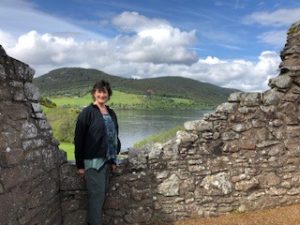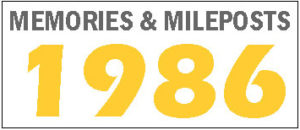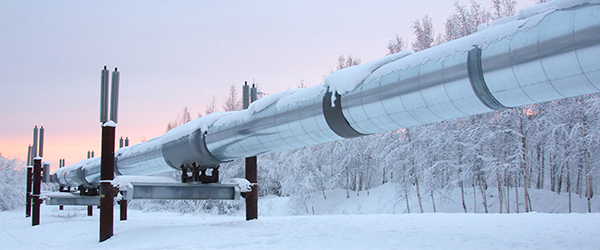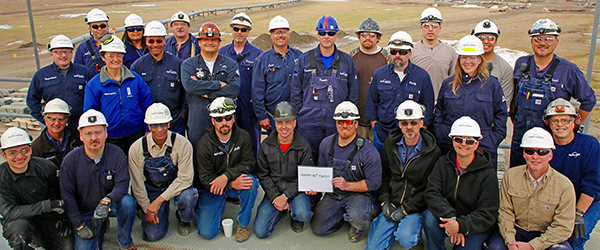1986: Richelle Talvi

Compare the early 1980s on the Trans Alaska Pipeline System to today, and the differences are striking.
Back then, all pump stations were rolling. Daily throughput climbed, yet to peak in the late 1980s. The pipeline thrived in its relative infancy in an oil-enthusiastic Alaska where the construction boon had launched new career opportunities, from the Slope to Valdez.
And Richelle Talvi was there for it. Of all women employed today at Alyeska, Richelle has the distinction of claiming the oldest original hire date: April 17, 1986, according to HR’s records. By Richelle’s own record-keeping, she came to TAPS even earlier, hired in 1981 to staff an Alyeska administration assistant position at Pump Station 7 as an Alyeska Special Services employee (that time was immediately converted to Alyeska time upon permanent hire).
Which brings up another difference about those earlier days that Richelle recalled: “At Pump Station 7, there was a temporary camp at the time and also Alyeska facilities, and in the temporary camp, that’s where the contractors stayed, they could have alcohol.”

Richelle’s supervisor, Rod Pugh, had some straight talk early on in Richelle’s stint about exercising care around contractor camps: “He sat me down and said, ‘If you go over there, you’re not supposed to have alcohol, you’re Alyeska,’” Richelle recalled. “He said, ‘So if you go in someone’s room, leave the door open, or if someone comes to your room, leave the door open, because perception is reality and people will talk.’
“At the time I thought that was really strange, but it was probably the best advice I got being out there,” Richelle said, reflecting on those much-different days when she was a young woman in her early 20s. “I don’t know how to say it nicely, but it was a man’s world so to speak. I was lucky that my supervisors really mentored me along the way.”
Raised in Fairbanks, Richelle’s teenage years were quite literally impacted by TAPS construction: with the pipeline population boom, high schools were overcrowded and teenagers had to double shift, attending either an early or afternoon session.
“There were just too many people,” Richelle said. “Most adults were working on the pipeline and if you weren’t, it was really easy to find a job. I started working when I was 14 because they couldn’t get people to stay in Fairbanks. Fairbanks was the hub and mostly the (union) halls hired out of Fairbanks so people left for the field and better pay.”
Industrious, Richelle used the mornings to work at a local bank and walked to school for the afternoon shift.
“The pipeline was literally being built all around me, but I was a teenager and I could have cared less,” she said. “If you had told me I was going to start working for Alyeska four years after I graduated, I would have laughed at you. And I’m also pretty sure I would have paid better attention to what was going on.”
Richelle left Fairbanks after high school. She spent time in college in Washington until a family death drew her to Anchorage. There, her dear friend Kristi Acuff was enrolled at UAA and encouraged Richelle to join her, so she did. (Alyeska employees may recognize Kristi’s name: years later, she led Alyeska’s HR team, then served as an Alyeska Vice President. The two women remain friends today.)
Richelle said she tried UAA, but finding herself several years out of high school now, she turned her attention to work. Temporary positions were a natural fit with plenty of opportunities, and it so happened that one was with Alyeska, based out of Fairbanks (home), staffing a project at Pump Station 7. And so began Richelle’s on-and-off, decades-long career at Alyeska.

She applied for a position with the Van Horn Equipment Shop (to stay in Fairbanks near family) and official Alyeska employment began. Truth be told, her Anchorage co-workers thought she was crazy – who wants to work in Fairbanks? At that time, there weren’t many Alyeska employees here.
After having children, she quit Alyeska for a few years. Deciding she needed to be around adults, she worked as a part-time contractor in the Equipment Shop. Eventually, she was officially re-hired in SCADA. After several years, the SCADA department was eliminated. She moved to Security, then PS07 again. During this time, if you were Alyeska and your position was cut, the company would often bump a contractor for an Alyeska employee (hence so much moving into different positions).
“There weren’t a lot of women,” Richelle said, looking back. “I don’t think there were any women on the Executive Team. Now you look at the org chart and there are seven women on the Executive Team? We’ve come a long way.”
A word to describe those early days? “Busy,” Richelle said. “When I was initially hired in the Anchorage office, over on Bragaw Street, it was busy. One of the things I remember about working then was it was kind of a dress-up competition. We didn’t have casual Friday. It was dresses or pant suits. People weren’t running around in jeans and tennis shoes.”
Next, Richelle had a stint in Projects during the Strategic Reconfiguration project to overhaul pump stations. Then she held a Maintenance role in ROW, before settling in Pipeline Maintenance Documentation out of the Fairbanks office in 2011, where she’s remained since.
Up until the 2018 reorganization, Richelle was on an Urban/Urban/Field/Off schedule, or UUFO, and she spent her field week between Pump Stations 1 and 4. She enjoyed the time out there getting to know the crews, leaving office dynamics behind, and riding the Haul Road with TAPS couriers who are always brimming with facts and stories.
“I did like working out in the field,” she said. “Did it contribute to operations? Not directly, it’s a support role. But somebody’s got to do it.”
Documentation, as a discipline, might sound too dry or procedural to some. But Richelle is detail-oriented. She likes the orderliness of it, and enjoys following the words to ensure they’ve accurately captured actions and eliminated risks.
“I’m not a technical writer,” she said. “But I do take the time when I’m revising something to think about things like, ‘Ok, if they open this valve, then it needs be closed again.’ Somebody can really get hurt if you don’t think those things through. I always try to look for stuff like that.”
She’s uncomfortable being “a nag,” as she jokingly referred to the need to make sure people complete their scheduled document reviews on time, so she and the Document Owner do not receive a MAC issue for overdue review. I’m from the old school of Alyeska and “thou shalt not receive a MAC” is engrained in my brain.”
Above all else during her time at Alyeska – the experiences, the scenery, the various job opportunities – Richelle has delighted in getting to know her coworkers and bring people together. Her favorite work days were those marked by picnics and potlucks (Pipeline Club), pie auctions and fundraisers. Though budget impacts, COVID, and other factors throughout the years have impacted those dynamics, she’s always thinking about ways to hold on to and resurrect those important aspects of bonding and team building.
“Our coworkers are what make this job great,” Richelle said. “Part of the value of working here is being part of this critical infrastructure – we do good work. But let’s face it, it’s like people say, when you retire and leave, you don’t miss the work: you miss the people. It’s the people who keep you around and there’s a lot to learn and people are willing to share their knowledge. You just have to ask.”
Another highlight of Richelle’s time within TAPS is her commitment to different charities throughout the years. As a team captain for American Heart she participates in the Fairbanks area program encouraging folks to learn about the program’s features and/or finding opportunities to further education and fundraising. And every year can be found as a strong participant of the United Way programs!
As a Documentation team member Richelle assists co-workers with their questions, all the while completing her procedure updates sent from the field (from P/L to Valdez).
Throughout the many years, Richelle has been a credit to Alyeska, community fundraising efforts, her team, and her many, many co-workers & friends.



